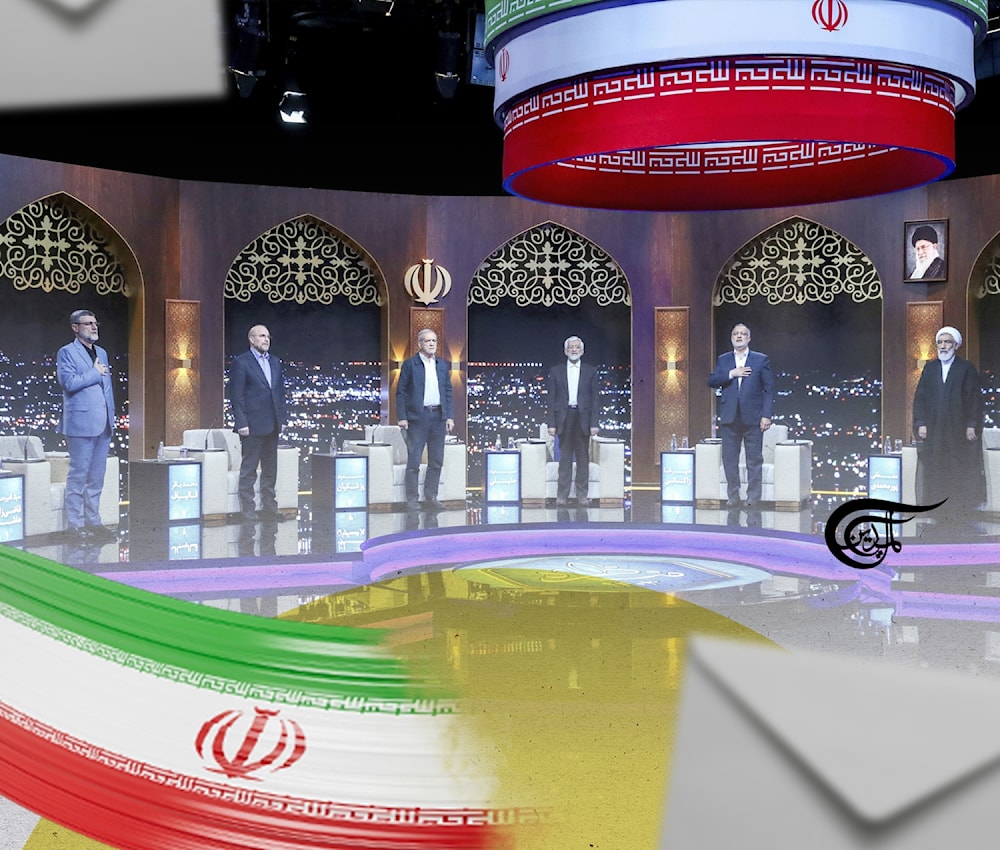The democratic strengths of Iran’s presidential elections
In a sign of building political rapport with the masses, observers got an early glimpse of potential policy agendas this week in a televised debate.
-

Given the range of illegal sanctions imposed on Tehran this year, the onus to support Iran’s legitimate national development endeavors is doubly important too (Illustrated by Mahdi Rteil to Al Mayadeen English)
Tehran is gearing up for highly anticipated presidential elections on June 28, and the lead-up to the contest offers interesting insights into the country’s democratic expression.
Six qualified candidates and their distinct credentials speak to the range of political diversity on display: it includes former Health Minister Masoud Pezeshkian, former Justice Minister Mostafa Pour Mohammadi, Supreme National Security Council member Saeed Jalili, current Mayor of Tehran Alireza Zakani, Vice President Amirhossein Ghazizadeh Hashemi and Parliament Speaker Mohammad Baqer Qalibaf. This month’s election also carries additional significance because it comes on the heels of former Iranian President Ebrahim Raisi’s tragic loss. Swift emphasis on a succeeding administration brings core policy priorities into focus: Iran’s future economic trajectory and the need to further strengthen strategic autonomy in the face of regional challenges.
Begin with the range of policy offerings to the masses and how they resonate with voter expectations. The current election contest refuses to give a backseat to future progression of the Iranian economy, efforts to confront unwarranted Western sanctions, long-term political stability and promotion of women roles. These priorities, and the range of candidates vying for presidency, indicate that there is no ‘one-size-fits-all’ approach to setting Iran’s future policy direction. The stakes are even higher, considering that scores of eligible voters are set to deliver their verdict to shape one of the most consequential political developments this year.
Given the range of illegal sanctions imposed on Tehran this year, the onus to support Iran’s legitimate national development endeavors is doubly important too. In a sign of priorities and broad-based consensus, the push to withstand decades of Western aggression continues to permeate into the electoral discourse. Consider presidential candidate Mohammad Baqer Qalibaf: he is centering his electoral activism on confronting sanctions, and has hinted on his broader aim to leverage relationships with China, Russia, India, Pakistan and Central Asia to better manage acute exposure to instruments of Western aggression. Qalibaf’s contributions to Iran’s Resistance front further strengthen the case for diplomatic tact and shrewd negotiations from the top.
But the strength of this year’s election is the way other candidates have come together to support an anti-sanctions resolve, regardless of other varied policy priorities. The determination of all six cuts across Iran’s political system, and their recognition that it is a path to economic self-sufficiency.
Moreover, another game-changing consideration in this year’s snap elections is a concrete vision to capitalize on Iran’s untapped economic potential. This dynamic should be seen as a litmus test for all six candidates’ potential to govern because quality growth could offset risks of a stark economic downturn. An Iranian economy undergirded by credible reforms, price controls and multisector expansion is also central to expanding Iran’s long-term influence, both domestically and on the international front. Thus, one critical variable to watch in the polls is how all six candidates translate their present anti-sanctions resolve into meaningful reform proposals and anti-corruption measures. These must promise workable economic relief from the outset, and ensure private sector expansion and greater citizen participation to score economic independence home.
In a sign of building political rapport with the masses, observers got an early glimpse of potential policy agendas this week in a televised debate. All six candidates delivered their takes on economic self-reliance, and multiple policy propositions suggest that presidential hopefuls are sizing up the economic challenge with the complexity that it deserves.
For instance, Qalibaf underscored the merits of a strong president to rein in inflation, while serving Iranian Vice President Amirhossein Ghazizadeh Hashemi insisted on replacing hollow economic rhetoric with executable economic relief plans. Thus understood, a decisive factor is the degree of resonation each economic intervention carries with Iran’s young generation voters this month, and its potential to support continuity in the post-Raisi era.
Despite Western sanctions and downward pressures, Iran’s economy still clocked five percent growth last year and its industrial sector is widely expected to take the growth lead this year. The prospect of expanding investment is also a welcome sign for Iran’s economic self-sufficiency goals, as indicated by Jalili. However, to generate ample space for a citizen-centric rule, it is imperative for Iran’s future president to consolidate national reconciliation efforts and deepen public trust. By ensuring a stronger alignment between social order and people-centric development policies, Tehran could be better placed to improve institutional governance long-term. Add to it the prospect of a much higher voter turnout, and the stakes are even higher.
Interestingly, Iran’s political landscape has evolved considerably over time. One of the most vivid illustrations is the contrasting support base of Qalibaf and Dr. Pezeshkian. The former is seen as a lead contender, given his traction among Iran’s powerful conservatives and their mobilization in the face of Pezeshkian’s more reformist political bloc. Conversely, Pezeshkian’s status as the only candidate banking on support from the moderates and reformists caps the strength of Iran’s current election: it brings participation from all political factions, underscoring diverse political sentiment and leanings among the country’s resilient population.
Ultimately, the June 28 elections have given way to fierce competition among candidates spanning a range of political convictions. The public verdict will be shaped heavily by the most appealing economic offerings, and the ability of candidates to lead an administration that is tall on delivery and grounded in deep-seated national political consensus.

 Hannan Hussain
Hannan Hussain
 6 Min Read
6 Min Read









